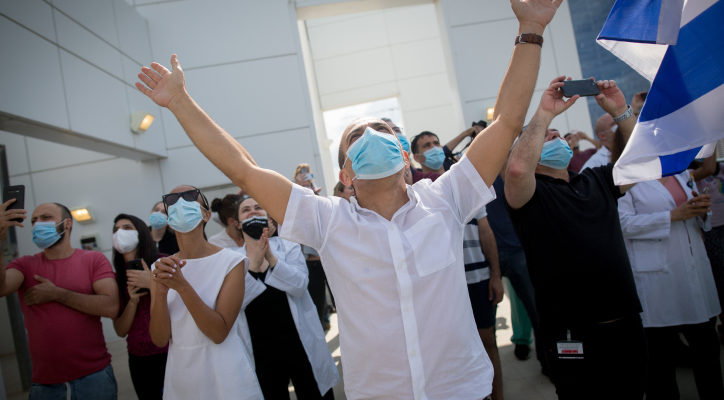Coronavirus numbers still dropping. Health Ministry prepares to test the country for “herd immunity.”
By Paul Shindman, World Israel News
Israel’s coronavirus numbers continued to stay low Wednesday with no overnight deaths attributed to the pandemic and only 43 new confirmed infections.
Health Ministry statistics showed the number of Israelis hospitalized with the virus dropped to 247, with 90 of them in serious condition, and of those, 70 were breathing with the help of ventilators.
The death toll stands at 238, and of the 16,314 people confirmed to have been infected so far, 10,527 have been declared recovered.
Several hotspots of infection remain as health authorities keep an eye on the cities of Bnei Brak and Jerusalem, as well as the Bedouin town of Hura in the Negev.
In an interview with the New York Times, health ministry director general Moshe Bar Siman-Tov said the government is preparing a nationwide testing campaign. Health officials fear the possibility of a second wave of coronavirus infections.
Bar Siman-Tov said Israel will perform 100,000 serological tests – diagnostic examinations of blood serum – in the coming weeks to check for COVID-19 antibodies.
The ministry wants to check if Israel has reached a state of “herd immunity” where most of the population is immune to an infectious disease, which gives indirect protection to those who aren’t.
Antibodies are produced in individuals who had been sick and recovered. If enough people have antibodies, then the population has reached a critical mass and has herd immunity, meaning health restrictions can be further relaxed.
If testing shows no herd immunity, officials say the country will have to prepare for a second wave of coronavirus infections that could hit anytime in the coming seasons.
“We cannot assume that there won’t be another wave, or that it will only happen in this coming summer,” Bar Siman-Tov told the Times.
The Times interview sparked a flurry of responses on social media from local news outlets asking why Israelis had to read about the testing program in a foreign newspaper.
“I read in the New York Times last night that Israel was about to begin the world’s most comprehensive serological survey of 100,000 people,” tweeted Channel 13 reporter Nadav Eyal.
“A. Great if true. B. The Ministry of Health continues its bizarre discourse strategies with the Israeli public,” he said, noting Israeli health officials hadn’t even bothered to post news of the testing plan locally let alone talk about it.
“Not bizarre, but apparently reveals the motivations of the ministry. The public in Israel is less important,” tweeted Israel Hayom health correspondent Maytal Yasur.





